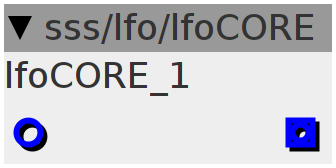lfoCORE
This is the "core" module for the "lfoSLAVE" module. This module contains the code, that the "lfoSLAVE" uses to calculate the LFO waveform and also calculates base/host frequency based on the "HS" trigger input. You only need this module once. The lfoSLAVE can be copied or it's code can be used in other modules. Just connect a trigger source to the input of this module to set root-rate. This way the code for all the different waveforms only has to be written once, saving memory when using multiple lfoSLAVEs. different waveforms: 0=sine 1=triangle 2=peak 3=saw 4=dip saw 5=shark saw 6=ramp 7=dip ramp 8=shark ramp 9= hump 10=dip 11=square 12=bipolar saw 13=bipolar ramp 14=collapsed sine 15=collapsed triangle
Inlets
frac32 feed a LFO trigger/continuous signal to clock-sync the LFO.
Outlets
frac32 outputs "base frequency" detected on HS input for use with other modules
Declaration
uint32_t Phase;
uint32_t PHS;
int32_t sine;
float32_t A[4];
// int32_t p;
int S;
int ttrig;
uint32_t count;
uint32_t timer;
int32_t rate;
int i;
int rtrig;
int32_t out;
int32_t TRG;
uint32_t BASE;
int32_t SIN(uint32_t P1) {
int32_t si;
SINE2TINTERP(P1 - (1 << 30), si)
return sine = si >> 4;
}
int32_t TRI(uint32_t P1) {
int32_t temp = P1;
temp = temp >= 0 ? temp : -temp;
return sine = (temp - (1 << 30)) >> 3;
}
int32_t PEK(uint32_t P1) {
uint32_t si = (uint32_t)(-(P1 >> 30)) << 31;
SINE2TINTERP(P1 + si + (3 << 30), si)
return sine = (si >> 4) - (1 << 27);
}
int32_t SAW(int32_t P1) { return sine = -P1 >> 4; }
int32_t RMP(int32_t P1) { return sine = P1 >> 4; }
int32_t SQR(int32_t P1) { return sine = P1 >= 0 ? (1 << 27) : -(1 << 27); }
int32_t HMP(uint32_t P1) {
int32_t si;
SINE2TINTERP(P1 >> 1, si)
return sine = (si >> 3) - (1 << 27);
}
int32_t DIP(uint32_t P1) {
int32_t si;
SINE2TINTERP(P1 >> 1, si)
return sine = (-si >> 3) + (1 << 27);
}
int32_t QS1(uint32_t P1) {
int32_t si;
SINE2TINTERP(P1 >> 2, si)
return sine = (-si >> 3) + (1 << 27);
}
int32_t QS4(uint32_t P1) {
int32_t si;
SINE2TINTERP((P1 >> 2) + (1 << 30), si)
return sine = (-si >> 3) + (1 << 27);
}
int32_t QS3(uint32_t P1) {
int32_t si;
SINE2TINTERP((P1 >> 2) + (2 << 30), si)
return sine = (-si >> 3) - (1 << 27);
}
int32_t QS2(uint32_t P1) {
int32_t si;
SINE2TINTERP((-P1 >> 2) + (2 << 30), si)
return sine = ((-si >> 3) - (1 << 27));
}
int32_t DSW(uint32_t P1) {
uint32_t si = P1 > (1 << 31) ? (1 << 31) - P1 : P1;
return sine = (si >> 4) - (1 << 27);
}
int32_t DRP(uint32_t P1) {
P1 = -P1;
uint32_t si = P1 > (1 << 31) ? (1 << 31) - P1 : P1;
return sine = (si >> 4) - (1 << 27);
}
int32_t ISN(uint32_t P1) {
int32_t si;
SINE2TINTERP(P1, si)
si = si >> 1;
return sine = ((si > 0 ? si - (1 < 30) : si + (1 << 30)) >> 2) - (1 << 27);
}
int32_t ITR(uint32_t P1) {
int32_t temp = P1;
temp = temp >= 0 ? temp : -temp;
temp = (temp - (1 << 30)) >> 3;
return sine = temp > 0 ? (temp << 1) - (1 << 27) : (temp << 1) + (1 << 27);
}
int32_t mode(int mode) {
switch (mode) {
case 0:
out = SIN(Phase);
break;
case 1:
out = TRI(Phase);
break;
case 2:
out = PEK(Phase);
break;
case 3:
out = SAW(Phase);
break;
case 4:
out = QS1(Phase);
break;
case 5:
out = QS2(Phase);
break;
case 6:
out = RMP(Phase);
break;
case 7:
out = QS3(Phase);
break;
case 8:
out = QS4(Phase);
break;
case 9:
out = HMP(Phase);
break;
case 10:
out = DIP(Phase);
break;
case 11:
out = SQR(Phase);
break;
case 12:
out = DSW(Phase);
break;
case 13:
out = DRP(Phase);
break;
case 14:
out = ISN(Phase);
break;
case 15:
out = ITR(Phase);
break;
}
}
int32_t LFO(uint32_t phase, int32_t poff, int32_t R, int32_t snc, int32_t RATE,
int Div, int32_t slope, int32_t wave, int32_t prec, int32_t STEP,
bool RTRG) {
rtrig = RTRG;
if ((R > 0) && (snc > 0) && !rtrig) {
rtrig = 1;
phase = 0;
} else if (R <= 0) {
rtrig = 0;
}
S = (wave)&15;
int32_t tmp = RATE >> 22;
int sel;
sel = tmp & 3;
int oct = tmp - sel >> 2;
prec = prec & ((1 << 28) - 1);
prec = prec > (1 << 27) ? (1 << 28) - prec : prec;
rate = BASE * A[sel];
if (oct > 0) {
rate = rate << oct;
} else {
rate = rate >> -oct;
}
int32_t trg = (phase >> 1) + (rate / Div >> 1);
trg = trg > 0 ? trg : -trg;
TRG = trg > (1 << 30) ? 1 : 0;
phase += rate / Div;
Phase = (((phase >> 1) > (1 << 30)
? ___SMMUL((uint32_t)(1 << 31) - (phase >> 1), slope << 1)
: ___SMMUL(phase >> 1, slope << 1))
<< 7) +
phase - (0 << 30) + poff;
int32_t qnt = 1 << (prec >> 22);
Phase = Phase / qnt * qnt;
Phase += ___SMMUL(Phase, STEP) << 3;
mode(S);
PHS = phase;
};
Init
timer = (1 << 31);
count = (1 << 31);
A[0] = 1;
A[1] = (float32_t)5 / 4; //(float32_t)9/8; etc for other divisions
A[2] = (float32_t)4 / 3;
A[3] = (float32_t)3 / 2;
Control Rate
BASE = (float32_t)(1 << 29) / timer * 8;
Audio Rate
if ((inlet_HS > 0) && (!(ttrig))) {
ttrig = 1;
timer = count;
count = 0;
} else if (!(inlet_HS > 0)) {
ttrig = 0;
}
count += 1;